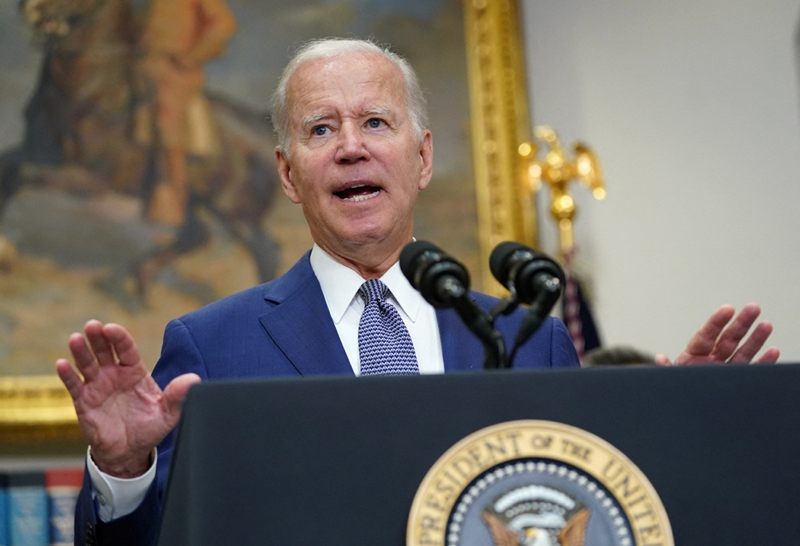Joe Biden taught hard lessons on Middle East trip

US President Joe Biden. [Photo/Agencies]
US President Joe Biden has drawn sharp criticism for his visit to the Middle East last week in a bid to get countries in the region, especially Saudi Arabia, to supply more oil to the US amid soaring oil and gas prices at home. His first meeting with Saudi Crown Prince Mohammed bin Salman in a country which he vowed to make a "pariah" has sparked outrage even among fellow Democrats.
To deflect criticism, Biden deployed the usual trick of smearing China. He accused China of taking "increasingly coercive actions" and said "we are not going to leave a vacuum in the Middle East for Russia or China to fill", claiming that the US-led new technology solution for 5G "will outcompete other platforms, including from China".
US officials bad-mouthing China, including on their foreign visits, is nothing new. But Biden picked the wrong place at the wrong time to do so.
At the Saturday summit with the Gulf Cooperation Council plus Egypt, Iraq and Jordan, Biden said: "We'll always honor the bravery, the selflessness, and the sacrifices of the Americans who served, including my son, Major Beau Biden, who was stationed in Iraq for a year."
Such remarks may appeal to US audiences, but they are outrageous for people in the Middle East who witnessed the long-drawn US-led war in Iraq based on sheer lies-that former Iraqi leader Saddam Hussein possessed weapons of mass destruction and was helping terrorists. The war created civil strife, caused the deaths of hundreds of thousands of Iraqi civilians, and displaced millions of others.
Who on earth would tout a globally recognized disastrous and unjust war in front of the people in the Middle East, especially those from Iraq?
Not only in Iraq, people in other parts of the region also are familiar with the US' footprints in the Middle East-the bombing and regime change in Libya even after it gave up its nuclear weapons program, the airstrikes and unlawful stationing of troops in sovereign Syria, and the flagrant bias in the Israeli-Palestinian conflict.
Biden may not realize that compared with the US, China today enjoys more favorable response in the Middle East and North Africa. The Pew Global Attitudes Survey in 2019, the last available due to the COVID-19 pandemic, shows that most people across the Middle East and North African countries surveyed are more likely to see US economic influence unfavorably.
Despite the efforts of Biden and some US journalists to drive a wedge between China and the Middle East, Saudi officials have not been coaxed or coerced, and instead rejected the US' plots.
Saudi Minister of State for Foreign Affairs Adel al-Jubeir told CNBC's Hadley Gamble that "we build bridges with people; we don't see one as exclusive of the other". He emphasized that, "China is our largest trading partner. It is a huge market for energy and a huge market in the future. And China is a big investor in Saudi Arabia", adding that any conflict with China is disruptive to the world.
CNN's Nic Robertson tried to push Saudi Foreign Minister Prince Faisal bin Farhan Al Saud to sing along with the US that "China is an enemy" and Saudi Arabia should distance itself from China, its missile system and Huawei's 5G. But he was told that Saudi Arabia wants cooperation, not confrontation, and will make decisions according to its own needs and understanding.
Responding to the US criticism of their country, Saudi officials were not shy to point out the poor US track record, from the false US intelligence assessment of Saddam Hussein and torture of prisoners in Abu Ghraib to the drone strike in Kabul last August that killed 10 Afghan civilians, including seven children, and disastrous state of affairs it left behind in Afghanistan after nearly two decades of occupation.
So instead of being allowed to lecture Middle East leaders and drive a wedge between them and China, Biden was taught some hard lessons on his four-day oil trip.
The author is chief of China Daily EU Bureau based in Brussels.








